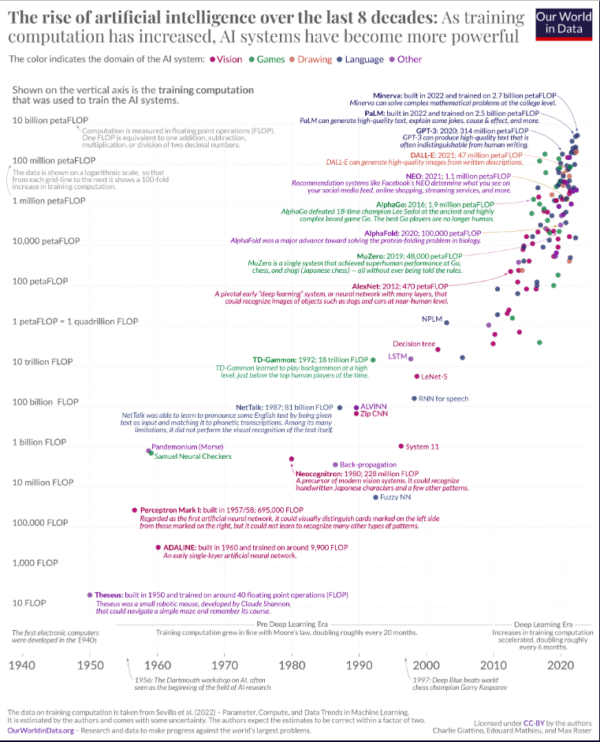This article examines the state of Artificial Intelligence (AI). We analyze its history with an eye toward what it may mean for the world in years to come.
The brief history of artificial intelligence: the world has changed fast – what might be next?
- Max Roser
- Our World in Data, 2022
- A version of this paper can be found here
- Want to read our summaries of academic finance papers? Check out our Academic Research Insight category
What are the Research Questions?
The author analyzes the world of computers and AI and asks the following questions:
- How did we get here?
- Where are we now?
- What is next?
What are the Academic Insights?
1. The picture below, taken from the original article (Roser, 2022), shows the timeline of how artificial intelligence (AI) systems evolved through time:

From the beginning of the ’40s with electronic computers and the ’50s with Theseus, a remote-controlled mouse capable of finding its way out of a labyrinth, to nowadays with systems capable of language and image recognition. For example, language recognition systems are now beating humans in tests in many domains, emails get auto-completed, online texts get translated, students use language models to do their homework, and media outlets publish AI-generated journalism.
2. Artificial intelligence is now fully present in our everyday life and is no longer a technology of the future. Examples are in the airline business with AI deciding the price you pay for a plane ticket as well as helping pilots fly to your destination; in the labour market with AI systems selecting candidates for jobs; in banking with these systems assigning loans and in social media usage with AI deciding what you see just to name a few.
3. Based on past experience where training computation went from doubling roughly every 20 months to doubling in just about six months, several studies (Cotra, 2020 and 2022; Roser, 2022) predict that “human brain-level” artificial intelligence will be developed within the next decades, and some believe that it will exist much sooner.
Why does Artificial Intelligence matter?
The wide range of listed applications makes clear that this is a very general technology that people can use for some extremely good goals – and some extraordinarily bad ones, too. Thus, it is paramount that all of us understand what is happening and how we want the technology to be used. Reviewing resources at this link is a good starting point to build an informed opinion.
The Most Important Chart from the Paper:

Abstract
Despite their brief history, computers and AI have fundamentally changed what we see, what we know, and what we do. Little is as important for the future of the world, and our own lives, as how this history continues.
About the Author: Elisabetta Basilico, PhD, CFA
—
Important Disclosures
For informational and educational purposes only and should not be construed as specific investment, accounting, legal, or tax advice. Certain information is deemed to be reliable, but its accuracy and completeness cannot be guaranteed. Third party information may become outdated or otherwise superseded without notice. Neither the Securities and Exchange Commission (SEC) nor any other federal or state agency has approved, determined the accuracy, or confirmed the adequacy of this article.
The views and opinions expressed herein are those of the author and do not necessarily reflect the views of Alpha Architect, its affiliates or its employees. Our full disclosures are available here. Definitions of common statistics used in our analysis are available here (towards the bottom).
Join thousands of other readers and subscribe to our blog.

